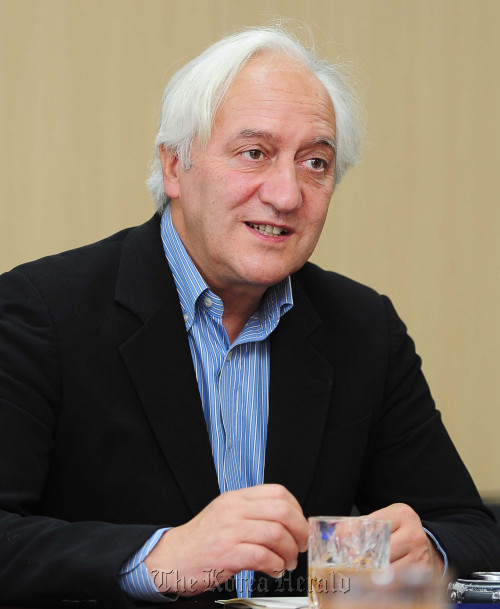Gwangju can recreate Edinburgh’s success, says ‘Creative City’ author
ByPublished : Oct. 17, 2011 - 19:43
The author of “The Creative City: A Toolkit for Urban Innovators,” Charles Landry, said Gwangju could become like Edinburgh in Scotland if the government encourages self-organized movements to make the city a hub for Asian culture.
Landry was on his way to Gimpo International Airport for a flight to Gwangju during the interview with The Korea Herald last Thursday morning. He had just been appointed advisor to the Korean government’s plan for Gwangju as “Hub City of Asian Culture” by Vice Culture Minister Park Sun-kyu.
“(The) major six or seven global cities in this game have so much energy and influx from other parts of the world. You can’t compare Gwangju to New York or to Shanghai. How can Gwangju make itself special?” Landry said.
Landry was on his way to Gimpo International Airport for a flight to Gwangju during the interview with The Korea Herald last Thursday morning. He had just been appointed advisor to the Korean government’s plan for Gwangju as “Hub City of Asian Culture” by Vice Culture Minister Park Sun-kyu.
“(The) major six or seven global cities in this game have so much energy and influx from other parts of the world. You can’t compare Gwangju to New York or to Shanghai. How can Gwangju make itself special?” Landry said.

“I think the basic theme to be a hub for Asian creativity should be more Asian creativity rather than only the art. To make it center for the Asian fringe would be a unique role for Gwangju,” he said.
The fringe is “the seed” which can balance mainstream tradition with the innovative and the new, he added.
The Korean government currently plans to construct the Asia Culture Complex as the main facility for Gwangju by 2014.
Landry said the government’s plan of placing most of the facilities underground, rather than building a big landmark is a “clever” idea, because people will not be able to remember Gwangju’s icon when listing big names such as New York’s Empire State Building and Sydney’s Opera House.
As the bus went through a tunnel on the way to the airport, Landry asked “How does it feel to go through this tunnel?” emphasizing that people, especially young generations, like to remember the atmosphere of streets and cafes rather than iconic buildings.
“If you want to keep interesting people there and attract them, the whole atmospherics of the place needs to be completely transformed. That’s going to be quite difficult for Koreans in general.”
The 63-year-old said Gwangju’s unique history ― the pro-democracy uprising 1980 ― will add another layer to the art aspect of the city.
“Gwangju can do even more (than Edinburgh) because there’s the democracy aspect. Art is partly about expression. This other layer ― democracy and peace ― is actually quite a strong thing,” he said.
However, Landry also pointed out that the biggest challenge for Koreans in making Gwanju the hub city of Asian culture will be shifting city makers’ mindset in a fundamental way from focusing on physical projects to seeing the software and enabling opportunities to flourish themselves.
Landry said he is currently working on a new book “Creative Bureaucracy” in which he will try to persuade bureaucrats to rethink the ruling system.
“I have interviewed many bureaucrats, many of them very intelligent. But the system that they operate reduces their potential to achieve aims and objectives,” he said.
By Kim Yoon-mi (yoonmi@heraldcorp.com)


![[AtoZ into Korean mind] Humor in Korea: Navigating the line between what's funny and not](http://res.heraldm.com/phpwas/restmb_idxmake.php?idx=644&simg=/content/image/2024/04/22/20240422050642_0.jpg&u=)
![[Exclusive] Korean military set to ban iPhones over 'security' concerns](http://res.heraldm.com/phpwas/restmb_idxmake.php?idx=644&simg=/content/image/2024/04/23/20240423050599_0.jpg&u=20240423183955)



![[Graphic News] 77% of young Koreans still financially dependent](http://res.heraldm.com/phpwas/restmb_idxmake.php?idx=644&simg=/content/image/2024/04/22/20240422050762_0.gif&u=)
![[Herald Interview] Why Toss invited hackers to penetrate its system](http://res.heraldm.com/phpwas/restmb_idxmake.php?idx=644&simg=/content/image/2024/04/22/20240422050569_0.jpg&u=20240422150649)





![[Exclusive] Korean military to ban iPhones over security issues](http://res.heraldm.com/phpwas/restmb_idxmake.php?idx=652&simg=/content/image/2024/04/23/20240423050599_0.jpg&u=20240423183955)



![[Today’s K-pop] Ateez confirms US tour details](http://res.heraldm.com/phpwas/restmb_idxmake.php?idx=642&simg=/content/image/2024/04/23/20240423050700_0.jpg&u=)